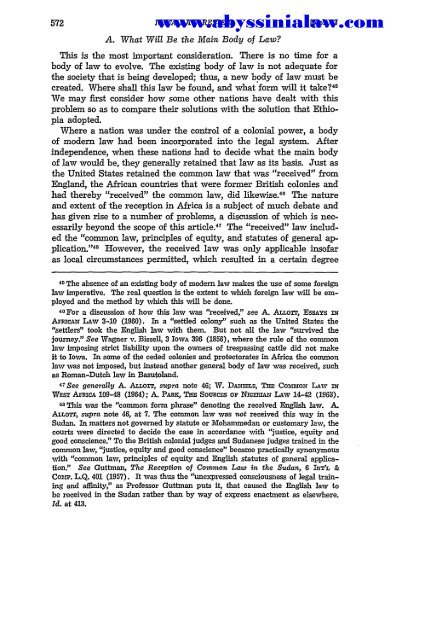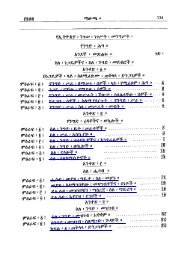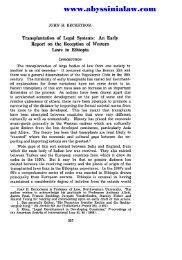You also want an ePaper? Increase the reach of your titles
YUMPU automatically turns print PDFs into web optimized ePapers that Google loves.
IOWA www.abyssinialaw.com<br />
LAW REVIEW<br />
[Vol. 53<br />
A. What Will Be the Main Body of <strong>Law</strong>?<br />
This is the most important consideration. There is no time for a<br />
body of law to evolve. The existing body of law is not adequate for<br />
the society that is being developed; thus, a new body of law must be<br />
created. Where shall this law be found, and what form will it take? 45<br />
We may first consider how some other nations have dealt with this<br />
problem so as to compare their solutions with the solution that Ethiopia<br />
adopted.<br />
Where a nation was under the control of a colonial power, a body<br />
of modern law had been incorporated into the legal system. After<br />
independence, when these nations had to decide what the main body<br />
of law would be, they generally retained that law as its basis. Just as<br />
the United States retained the common law that was "received" from<br />
England, the African countries that were former British colonies and<br />
had thereby "received" the common law, did likewise. 4 6 The nature<br />
and extent of the reception in Africa is a subject of much debate and<br />
has given rise to a number of problems, a discussion of which is necessarily<br />
beyond the scope of this article. 47 The "received" law included<br />
the "common law, principles of equity, and statutes of general application."<br />
48 1 However, the received law was only applicable insofar<br />
as local circumstances permitted, which resulted in a certain degree<br />
45 The absence of an existing body of modem law makes the use of some foreign<br />
law imperative. The real question is the extent to which foreign law will be employed<br />
and the method by which this will be done.<br />
4sFor a discussion of how this law was "received," see A. ALrorT, EssAYs 3N<br />
AnuicA LAw 3-10 (1960). In a "settled colony" such as the United States the<br />
"settlers" took the English law with them. But not all the law "survived the<br />
journey." See Wagner v. Bissell, 3 IoWA 396 (1856), where the rule of the common<br />
law imposing strict liability upon the owners of trespassing cattle did not make<br />
it to Iowa. In some of the ceded colonies and protectorates in Africa the common<br />
law was not imposed, but instead another general body of law was received, such<br />
as Roman-Dutch law in Basutoland.<br />
47 See generally A. ALrOT, supra note 46; W. DAN-ms, THE Comnozz LAw 3N<br />
WEST AFRIcA 109-48 (1964); A. PARK, THE SouRcEs oF NIGmmx Lw 14-42 (1963).<br />
48 This was the "common form phrase" denoting the received English law. A.<br />
ALLoTT, supra note 46, at 7. The common law was not received this way in the<br />
Sudan. In matters not governed by statute or Mohammedan or customary law, the<br />
courts were directed to decide the case in accordance with "justice, equity and<br />
good conscience." To the British colonial judges and Sudanese judges trained in the<br />
common law, "justice, equity and good conscience" became practically synonymous<br />
with "common law, principles of equity and English statutes of general application."<br />
See Guttman, The Reception of Common <strong>Law</strong> in the Sudan, 6 IT'fL &<br />
Coni'. L.Q. 401 (1957). It was thus the "unexpressed consciousness of legal training<br />
and affinity," as Professor Guttman puts it, that caused the English law to<br />
be received in the Sudan rather than by way of express enactment as elsewhere.<br />
Id. at 413.





